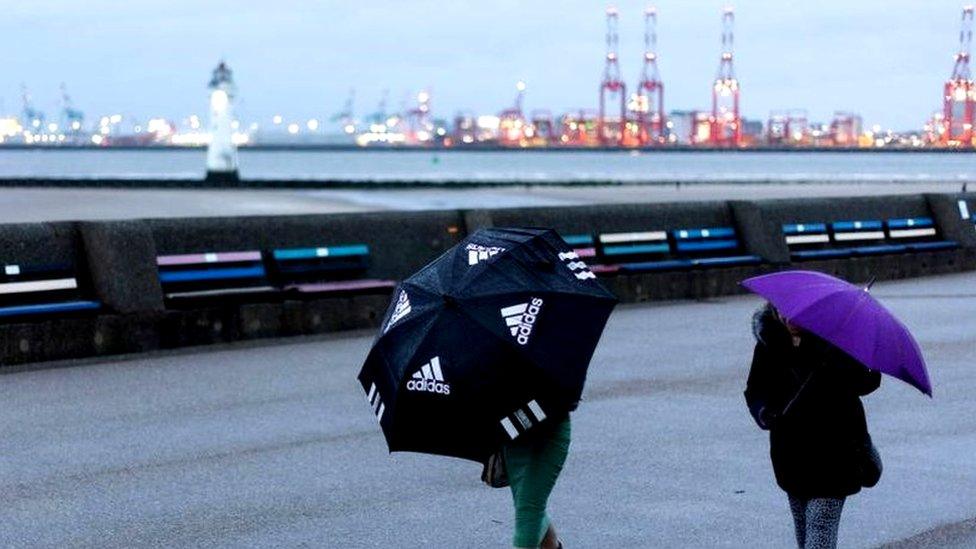Storm Jocelyn: 97mph gusts recorded after heavy winds hit UK
- Published
Watch: How two storms in four days wreaked havoc
Storm Jocelyn has moved across the UK, as gusts of up to 97mph winds swept across the country.
Tuesday was marked by heavy rain in parts, with strong gusts across much of the country on Wednesday morning.
The strongest gust so far, 97mph, was recorded in Capel Curig, north Wales, while in Scotland trains stopped running on Tuesday evening.
The centre of the storm has now passed the UK, and is much weaker than it was on Tuesday night.
However, it will remain windy on Wednesday afternoon across Scotland and some of northern England, where a yellow weather warning for wind was in place until 15:00 GMT and gusts of up to 55-65mph were expected.
The weather for the rest of the week looks unremarkable, with some cloud and rain in some areas, but no clear sign of the next named storm - Kathleen - in the forecast.
It has been a particularly stormy autumn and winter, and Storm Jocelyn is the 10th named storm of the season.
The storms have mainly been driven by a powerful jet stream - fast-moving winds high in the atmosphere - crossing the Atlantic, although global phenomena such as the El Niño event also have an impact.
Elsewhere, a search involving coastguard crews, a helicopter and RNLI lifeboats, for a person reported to be in the sea at Porthcawl, south Wales, has resumed after it was suspended overnight.
Both Isha and Jocelyn have disrupted the journeys of many road, rail and air travellers.
ScotRail said a small number of services had resumed on Wednesday, having been suspended on Tuesday evening.
Phil Campbell, ScotRail's customer operations director, said the company was aware of some damage overnight.
Network Rail Scotland said on Wednesday that most routes have been inspected and re-opened, with most being opened in a controlled manner.
An exception is the Highland Mainline route between Pitlochry and Perth, where river levels are too high for inspection to be possible.
TransPennine Express, which runs services between northern England and Scotland, is advising customers not to travel until noon on Wednesday on its Preston to Glasgow and Preston to Edinburgh routes.
Avanti West Coast said its services to and from Scotland would be cancelled until at least midday on Wednesday.
The storm also caused "major disruption" on Northern Ireland's road network, an official said, and the main road to Belfast International Airport remained closed on Wednesday. The QE2 bridge at the Dartford Crossing on London's M25 also shut on Wednesday due to strong wind, but has since reopened.
Labour has called for a "flood resilience taskforce" to be established to strengthen long-term protections for future freak weather events.
In an urgent question in Parliament, shadow Cabinet Office minister Pat McFadden said such a unit should be established "given the frequency of extreme weather events".
In response, Cabinet Office Minister Alex Burghart said the government has learned lessons from past storms, and taken greater efforts to prepare for future extreme weather events.
In Northern Ireland, power has been restored to 52,000 homes since Storm Isha, but 1,400 customers are still without electricity, according to NIE Networks, external.
Elsewhere in the UK, Electricity North West, external said power has been restored to 96% of customers affected by Storm Isha.
In northern Scotland, Scottish and Southern Electricity Networks said that as of 08:00 on Wednesday supplies had been restored to 2,200 customers in the north of Scotland, with just under 2,400 properties currently without.
As of 12:45 on Wednesday there are also 25 flood warnings in place across Scotland, external as well as 19 in England, external.
In York, parts of the city have flooded with water levels on the River Ouse already very high, and set to rise further.
Meanwhile, a man who died after the car he was in hit a fallen tree in Scotland during Storm Isha on Sunday has been named as James "Jimmy" Johnstone, 84, from Grangemouth, Stirlingshire. His family described him as a "much loved and well respected family man".
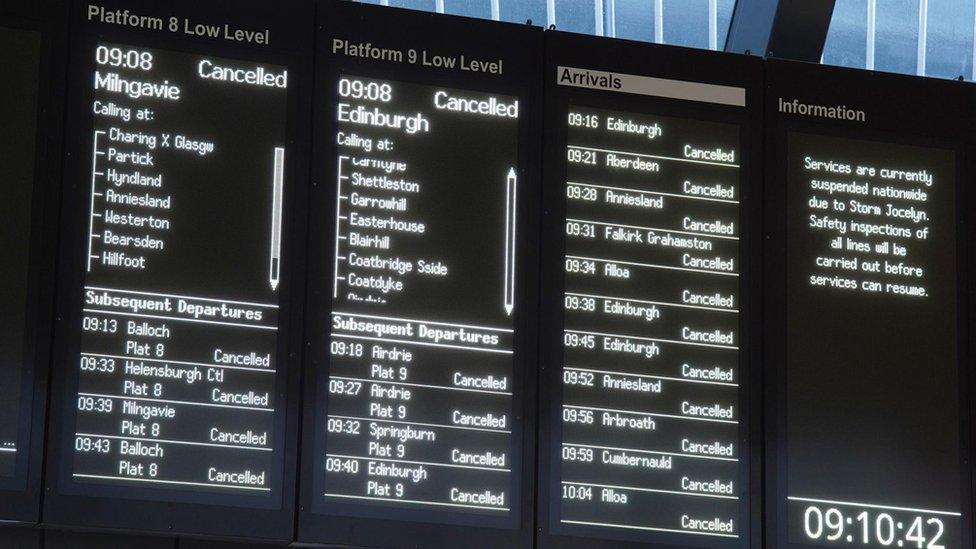
ScotRail trains were cancelled on Tuesday evening, although some services have resumed
Motorists are being urged to reconsider making journeys where the weather is expected to be the worst, including western and southern Scotland and north-west England.
"With so much heavy rainfall and debris on the roads, driving conditions will be very challenging," RAC spokeswoman Alice Simpson said.
"We also suggest drivers avoid parking underneath or near to trees," she added.
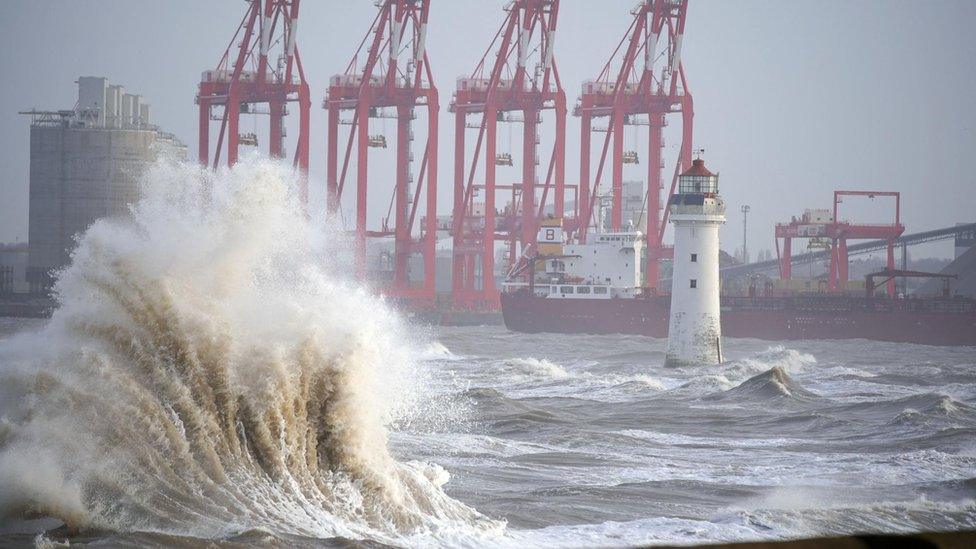
The scene at New Brighton beach, Wirral on Wednesday morning
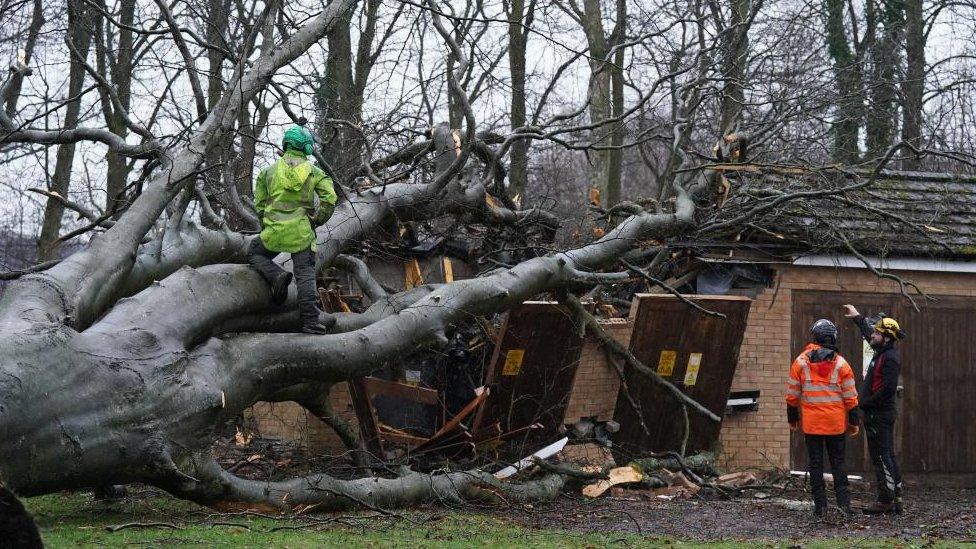
Workers remove a tree that fell on an electricity substation on the Kinnaird estate in Larbert

How is the weather affecting you? Share your experiences by emailing haveyoursay@bbc.co.uk, external.
Please include a contact number if you are willing to speak to a BBC journalist. You can also get in touch in the following ways:
WhatsApp: +44 7756 165803
Tweet: @BBC_HaveYourSay, external
Please read our terms & conditions and privacy policy
If you are reading this page and can't see the form you will need to visit the mobile version of the BBC website to submit your question or comment or you can email us at HaveYourSay@bbc.co.uk, external. Please include your name, age and location with any submission.
Related topics
- Published22 January 2024
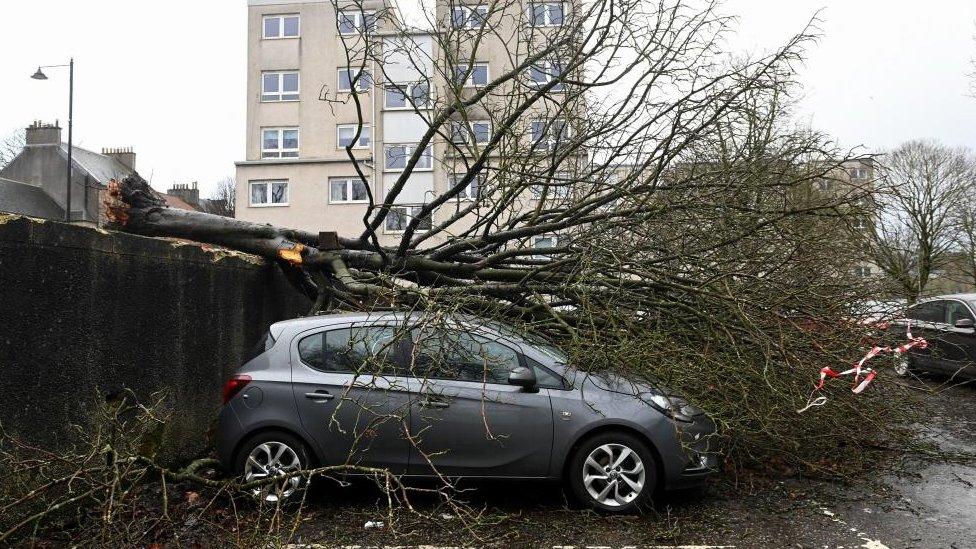
- Published22 January 2024

- Published5 April 2024
